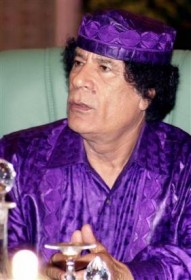LONDON, (Reuters) – Libyan leader

caused a month-long nuclear scare in 2009 when he delayed the return to Russia of radioactive material in an apparent fit of diplomatic pique, leaked U.S. embassy cables showed yesterday.
The incident was kept secret by U.S. diplomats who feared “shoddy” security at Libya’s Tajoura nuclear facility, near Tripoli, risked the theft of the 5.2 kilograms (11.5 pounds) of highly enriched uranium (HEU), according to documents released by the website WikiLeaks.
The seven casks of spent nuclear fuel were due to be flown to Russia for disposal on a specialised transport plane in November 2009 as part of Gaddafi’s promise to abandon Libya’s programme of weapons of mass destruction.
But instead Libya refused permission and the Russian plane took off without its cargo, leaving the casks on the runway tarmac at Tajoura overseen by a solitary guard.
The reason for the sudden change of plan appeared to be that Gaddafi had taken offence at his treatment during his visit to New York to address the United Nations two months earlier.
Gaddafi had felt “humiliated” after being barred from pitching his large Bedouin tent in New York and from visiting the Ground Zero site of the Sept. 11, 2001 attacks, his son Saif al-Islam told Gene Cretz, the U.S. ambassador to Tripoli.
Details of the cables were published Britain’s The Guardian newspaper, one of a number of publications which has been given advance access by WikiLeaks to over 250,000 cables.
The cables reveal the increasing anxiety of U.S. and Russian officials over the fate of the nuclear fuel, which was only sealed for transport, not storage, and would overheat and crack their flasks if not swiftly dealt with.
A U.S. diplomat told a Libyan official there could be an “environmental disaster” if the casks were not shipped to Russia for disposal within a month, one cable showed.
Cretz wrote on Nov. 25 at the start of the crisis that it was essential to keep the incident secret.
“Given the highly transportable nature of the HEU and the shoddy security at Tajoura, any mention of this issue in the press could pose serious security concerns,” he said.
“The Libyan government has chosen a very dangerous issue on which to express its apparent pique about perceived problems in the bilateral relationship,” he added.
The crisis was resolved after U.S. Secretary of State Hillary Clinton sent a personal message for Gaddafi assuring him of the U.S.’s commitment to its relationship with Libya.
The message was positively received and security was stepped up around the nuclear material before a Russian plane took off from Tripoli with the flasks on December 21.
A cable reporting the flight’s departure noted that it marked the successful completion of Libya’s commitments to dismantle its nuclear weapons programmes.
It added that the month-long impasse had taken a “visible toll” on Ali Gashut, the head of the Libyan Atomic Energy Establishment.





